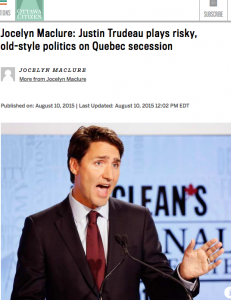1.
As far as the mainstream media is concerned, 2016 will be remembered as the year that the the print media ran out of runway, as the transition-to-digital bluff was called. There is no serious digital business model to speak of for online publishing – the recent round of mass layoffs at Medium only underscoring that even the digital-only ad-supported initiatives are a fool’s errand.
What should be done? For a while now, my view has been the same as Ken Whyte’s — we should do nothing. And that is pretty much the view I expressed at two of the seminars run by the Public Policy Forum as part of their initiative to determine if the decline of the news media is a problem, and if so, what should be done about it. My answers have been: Yes it’s a problem, and there’s not much to be done until the convulsions have ended.… Continue reading

